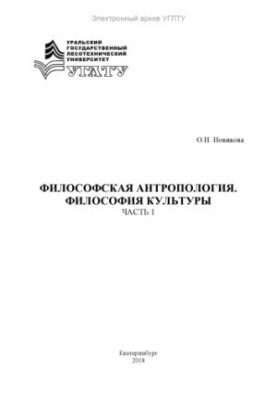Philosophical Anthropology. Philosophy of Culture (basics of the course and fragments of primary sources). Ch. 1
 Instant download
Instant download
after payment (24/7)
 Wide range of formats
Wide range of formats
(for all gadgets)
 Full book
Full book
(including for Apple and Android)
The Philosophy of Anthropology . Philosophy of culture (basics of the course and fragments of primary sources) . H. 1" by O. N. Novikov is a fascinating and in-depth study that immerses the reader in a world of philosophical reflections on man and culture. This work not only serves as a textbook, but also becomes a real guide to complex and multifaceted topics related to human nature, cultural identity and the philosophical foundations of our existence. In the first part of the book, Novikov offers readers a unique view of philosophical anthropology as a discipline that studies man in the context of his cultural environment. The author analyzes the key concepts and ideas that have shaped human understanding over the centuries, ranging from ancient philosophy to modern trends. The reader will find here not only theoretical foundations, but also fragments of primary sources that allow a deeper understanding of how various philosophers and thinkers approached issues related to human essence. This book will be of interest to a wide range of readers: from students and teachers of humanities to everyone who is interested in philosophy, culture and sociology. It will be useful for those who seek to broaden their horizons and deepen their understanding of human nature and cultural processes. If you are looking for literature that will help you comprehend the complex questions about what it means to be human and how culture shapes our perception of the world, then Philosophical Anthropology will be a real find for you. The topics raised in the book are relevant and important for modern society. Novikov explores how cultural contexts influence identity formation, how philosophical ideas intersect with real life, and how they can help us better understand ourselves and the world around us. In the context of globalization and cultural diversity, issues related to human nature and cultural differences are becoming particularly acute. The book offers the reader an opportunity to reflect on how philosophy can serve as a tool for analyzing and understanding these processes. Style O. N. Novikov is distinguished by clarity and accessibility, which makes complex philosophical ideas understandable to a wide audience. He skillfully combines theoretical calculations with practical examples, which allows the reader not only to assimilate the material, but also to apply it in his life. This makes the book not only educational, but also inspiring. In addition, Novikov is the author of other well-known works that also explore philosophical and cultural themes. His work is often of interest to readers seeking a deep understanding of human nature and cultural processes. If you’re interested in authors like Martin Heidegger, Emile Durkheim, or Zygmunt Bauman, you’ll find many intersections in Philosophical Anthropology with their ideas and concepts. In conclusion, “Philosophical Anthropology . Philosophy of culture (basics of the course and fragments of primary sources) . H. 1" is not just a book, but a whole world that opens up to the reader. It offers a unique opportunity to reflect on what it means to be human in a contemporary cultural context. If you are ready to immerse yourself in philosophical reflection and discover new horizons of understanding, this book will become your faithful companion on this fascinating path.
LF/877428630/R
Data sheet
- Name of the Author
- Новикова
О. Н. - Language
- Russian



















